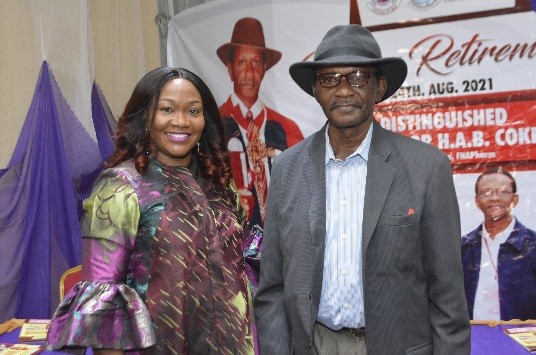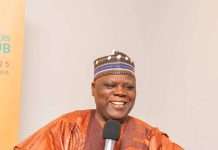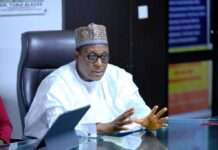
Distinguished Professor Herbert Afamefuna Babington Coker is an erudite scholar and researcher of great repute. A devout Christian and retired professor of pharmaceutical chemistry, Coker is especially acclaimed for his contributions in the area of sickle cell disease (SCD), among numerous other accomplishments. The University of Port Harcourt, where he has lectured for the past 12 years, on a largely pro bono basis.
Fondly called “Rabbi” within the precincts of the College of Medicine, University of Lagos because of his very friendly disposition to colleagues and students, the revered don jocularly refers to himself as “Rabbi and the Lord Bishop of the Lost Tribe (slave returnees) of Nigeria.” In this exclusive interview with MOSES DIKE, Professor Coker lets us into the interesting world of his upbringing, education, career, and retirement. Excerpts:
Kindly tell us about yourself, sir – your early childhood experiences, education, and the events that have helped to shape your adult personality.
I sincerely appreciate you for giving me this opportunity and the rare honor of being part of Nigeria’s foremost pharmaceutical journal. I have known Pharmanews for up to 40 years. I sincerely appreciate the impact it has come to bear on pharmacy practice in Nigeria and the world, in general.
Pharmanews is in a class of its own and I doff my hat to the ebullient Chief Executive, Sir Pharmacist Ifeanyi Atueyi, and his ever-productive and loyal staff for the professional services they have rendered to date. I admire and savor the diverse write-ups and contributions of the erudite columnists in every issue of Pharmanews. Please, keep the good work going. The good Lord is ever your strength.
Humbly put, I am Herbert Alexander Babington Afamefuna Kobna Coker. I was born in Yaba, Lagos. In other words, Yaba is my village. I had my childhood upbringing in the precincts of what we could call the British Yaba South, encompassing the All Saints’ Church, Montgomery Road, and its adjoining streets. These include Sabo Market, Moore House Road, Saint Dominic Catholic Church, Yaba Methodist Church (Hoares Memorial Methodist Church), Commercial Road, Morris Street, Aje Street, and their environs. The areas formed the golden Yaba that heralded my youthful truancy when Lagos was Lagos.
The earlier settlers in these areas included the West Indians and their descendants, the Serria-Leonian descendants, the Itsekiris, the Urhobos, the Igbos, the Efiks, the Yorubas, and a handful of Hausas. The All Saints’ Church, Ladilak Institute, and Yaba Methodist Church/School stood out prominently within the precincts. As children, we were enamored with either Ladilak Institute, under the watchful eyes of Mrs. Rita Akaje-Macaulay, or the All Saints Church, under the watchful eyes of Canon Hunter of blessed memory.
My very close friends then, the Benites, the Idimujes, and the Atandas were all my pals at the All Saints Church Boys Brigade Movement and Sunday school. My very good friend, Prof. Gbolahan Awosanya at that time was in the Yaba Methodist boys Brigade Movement. We met at joint rehearsals. I was made to understand that Professor Olusoga Sofola, former provost of the College of Medicine and deputy vice-chancellor, University of Lagos, is a distinguished alumnus of Yaba Methodist School, a provincial school then; while Ladilak Institute, was a cosmopolitan and egalitarian citadel of learning.
That was the clime and atmosphere of our youthful days. We all played together under the watchful eyes of the late Mrs. Ama Pepple (Mama Degema) of Harvey Road, All Saints Church, Yaba; the late Canon Hunter; the late Mrs. Macaulay; and several other aunties and uncles. We did not take much notice of any Igbo, Yoruba, or Hausa factions during our days.
Were those the ones who had the most impact on your life?
Later on in life, I was to meet with some other eminent gentlemen, who impacted so much on my life. These included the likes of the late Dr. J. A. Adegbite (of the Lagos Baptist Academy) and the late Canon Emmanuel O. Alayande (of Ibadan Grammar School) where the Christian liturgies and religious rites were ingrained in us compulsorily. May God grant eternal and blissful rest to the souls of these fine mortals!
Further on, along my Christian trajectory, I encountered other gentlemen. One was Professor Gabriel E. Osuide of the School of Pharmacy, Ahmadu Bello University – a thorough-bred academic and university administrator; along with other academics – Professor Fola Tayo, Prof. Charles Wambebe, Dr. G. Lahan, Professor Oyawole, Professor E Sokumba, Professor Mustapha Abdullahi. Very fine mortals in their own right.
Prof. G. Osuide was a very stern and disciplined man. A very fine teacher, professor, and researcher. But then, behind the no-nonsense mien, laid a very understanding and thoughtful heart. I approached Professor Osuide in Zaria when admissions into the pharmacy program were almost concluded. I introduced myself to him in his office and presented my case for admission rather late in the day. He looked at my GCE A level results and a letter written by my father, passionately pleading for his assistance. Prof Osuide looked at all the documents before him and asked me to go.
After a few weeks in Lagos, I got a letter from the Ahmadu Bello University (ABU) administration announcing my admission into the pharmacy program at ABU. I must confess to you that ever since then, Professor Osuide has always occupied a space in my personal subconscious. Back in school those days, we couldn’t go near him. We kept our distance from this no-nonsense Professor of Pharmacology. Professor Osuide taught Pharmacology from first principles, using copious Illustrations with chalk on the board – an attribute I was to emulate later in life.
I must also confess that I didn’t even remember to go near him and say “thank you” for the kind gesture shown to me when I needed help.
I lost my father, Increase Coker, in 1991, and at his funeral on 20 December that year, I entered the All Saints’ Church, Yaba, with my father’s casket, and some way down the aisle towards my left, I saw Professor Osuide and Dr. Dere Awosika in the church at my father’s funeral.
I was confused and flabbergasted. What should I say in that present condition of mine? But, then, these observations were to form the fulcrum of some foundational attributes on which I based my teaching style and lecturer-student relationship in life.
When Professor Osuide was celebrating his 80th birthday at one of the event centers in Victoria Island, Lagos, Dr. Dere Awosika summoned some of us her contemporaries to the event. I gladly attended the event. I proceeded to the front row of the seats to greet Professor Osuide, who welcomed me very warmly; we even took photographs together.
A couple of days after the event I received a phone call, apparently from Professor Osuide, thanking me for coming to grace the occasion of his 80th birthday anniversary celebrations. We had a few discussions. I was literally swept off my feet as something flashed through my mind. This highly educated University of London first-class graduate and all the exposure to Western education could still demonstrate some Esan village attributes! The same gesture was extended to my pals who attended the outing.
I tried to recall some of our cultural attributes in my village, Yaba, Lagos. Then I realized what the white man had done to our village culture, to some extent. (That is if we had any traditional culture at all in Yaba). I must confess that the gesture from Professor Osuide was a learning curve in my life, my age notwithstanding. We have met at several other instances. It is my fault that I have not found time to go and say hello to him in his house somewhere at Dolphin Estate, Ikoyi, and present him with a beautiful bouquet of flowers, in keeping with our tradition, as Yaba slave returnees.
Another man that had touched my life from a distance until I got to know him properly is that humble man called Sir Ifeanyi Atueyi. He is a Knight of the Anglican Order, another native man from Okija. I didn’t know this man from Adam, other than that each time my father wrote to me in Glasgow, he always mentioned to me one Ifeanyi Atueyi, an ex DMGS Onitsha product. Apparently, it would seem that Ifeanyi Atueyi was a member of the DMGS Old Boys executives, who amongst their numerous tasks, made out time to ask about the welfare of their senior colleagues and senior citizens, still living.
It was on my arrival from Britain that my father introduced me to Sir Ifeanyi Atueyi, during one of their calls at my father’s house in Ikeja. Later on, I got used to Sir Ifeanyi Atueyi, the friendly and ever-smiling gentleman, although I consciously kept some distance because of Okija Shrine, and I also came to realize that he was into some pharmaceutical journalism. The humble beginnings of Pharmanews were daunting; the wilderness journey was laced and strewn with herculean challenges. Sir Ifeanyi Atueyi kept trudging on with some tenacity, persistence, unpretentious Christianity, and with ever-ready and fine laughter, capable of melting the toughest of hearts.
Today Pharmanews is a success story, but then – lest will forget – not without hard work, prayers, and what I called astute professionalism. Sir Ifeanyi Atueyi is not a Bishop or a Reverend Father but then in his own quiet way, he is a man after the heart of God. In all the years I have known Sir Ifeanyi Atueyi, I am yet to see a man accuse him of standing in his way or usurping a neighbor’s right of way. Show me a man who enjoys God’s blessings in life and I will show you Sir Ifeanyi Atueyi!
You also seem to be close Dr (Mrs) Dere Josephine Awosika
Yes, she is a very dear colleague of mine, a tough-looking woman; hardworking in her right but she is a woman whose heart is full of compassion and kindness if you care to come close enough.
Dere served as the chief executive of the defunct National Programme on Immunisation (NPI) of the Federal Ministry of Health, under the former minister, Professor Eyitayo Lambo. Dr. Awosika conceived and initiated the outfit. She invited professionals from various health establishments. Dere has been so magnificent to our classmates and her contemporaries.
As the chieftain of the oral polio vaccine administration, she reached out to all the rank and file pharmacy practitioners who cared to call on her. She was friendly and disposed to contemporaries and colleagues. Dere can be hard and demanding but then at the same time she is the type who shows care and concern. Open Dere’s heart any day and what you find is an avalanche of honey and milk.
How did you come about Pharmacy as a course of study? Did you have any role models who guided you to make the choice? If you were not a pharmacist, what else would you have loved to become?
Well, there are two of us who took to the sciences in my family. My other brother studied Medicine at the University of Ibadan, while I studied Pharmacy at ABU. Our father in his final year at the secondary school (DMGS, Onitsha) was preparing for his Cambridge Exams and also the Entrance Exam to Yaba School of Medicine. Unfortunately, he had an accident and could not write any of the exams. He was left in an unfortunate and circumstantial state.
As a matter of fact, history has it that the tragedy of the misfortune was such that his only parent, the mother on hearing what happened to her only child, went to bed that evening and never woke up till this day. His two-year stay in the hospital was chaperoned by the younger sister of the mother, Mrs. Sophia Thomas Birch-Freeman.
When Pa left the hospital in 1941, he was introduced to one Mrs. Rita Akaje Macaulay by a close friend to Mrs. Thomas Birch-Freeman, Mrs. Amah Pepple. Increase Coker started as a pupil teacher under Mrs. Akaje Macaulay at the Ladilak Institute, Yaba. Mrs. Amah Pepple later became a galvanizing force of encouragement to the young Increase Coker. His enrolment at the All Saints Church as a parishioner, his introduction to Dr. Nnamdi Azikiwe, as a young newspaper reporter and editor, and his marriage to a young Onitsha woman called Gladys (through the auspices of the Anglican Missionaries who brought Gladys to Lagos from Kano) were all supervised by Mrs. Amah Pepple, Mrs. Birch-Freeman and some Sierra-Leonian women within the precincts of Yaba South.
Papa was very determined that since he couldn’t attend the Yaba School of Medicine, one of his children would definitely pick up the profession of Pharmacy. So, right from our childhood, my father had started drumming into our ears that one of us would go to Yaba School of Pharmacy. Our education and exposure were in the realm of the sciences.
Pa also admired a couple of his pharmacy friends. He was looking forward to one of his children becoming a pharmacist with a big shop in the neighborhood attending to different kinds of patients and making money. Later in life, when the pharmacist opted to further his studies abroad and the doctor decided to run away to the US, my father became a dejected man. Apparently, he wanted a village pharmacist and a village doctor to be around him.
As a matter of fact, when Papa passed on, his will was read out. When we came to realize that papa left something for us, my brother and I were very happy that he did not disown us. Today, we keep praising God for giving us a very loving father.
Left alone I should have settled for the mathematical sciences because I flowed on easily in that realm. We were a little bit afraid of not doing the bidding of our father. He always referred to us as stubborn people.










